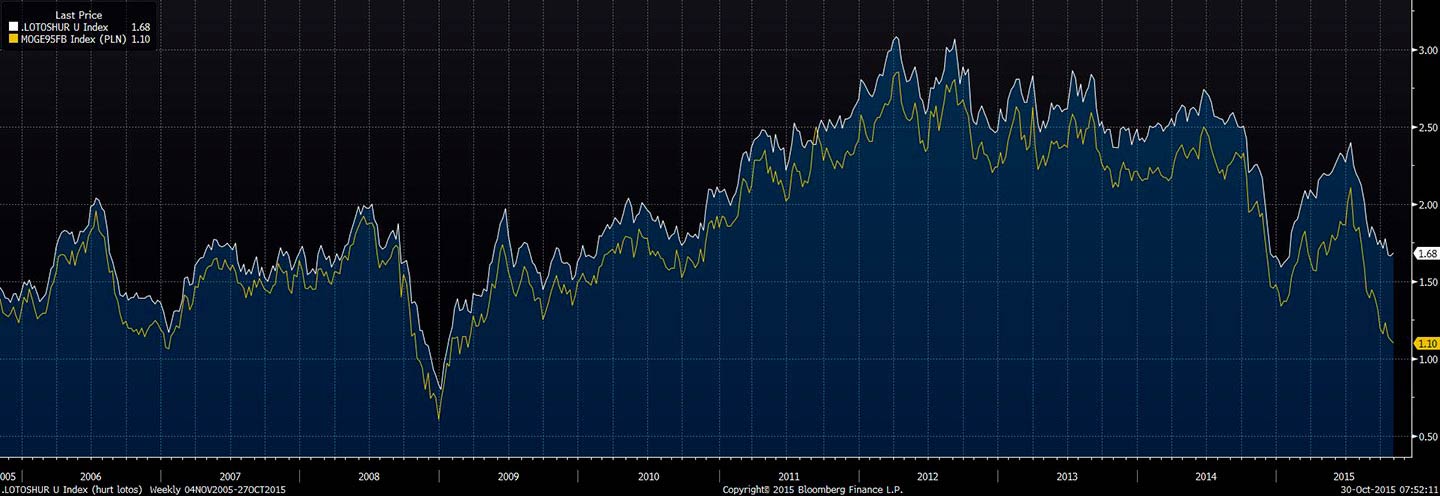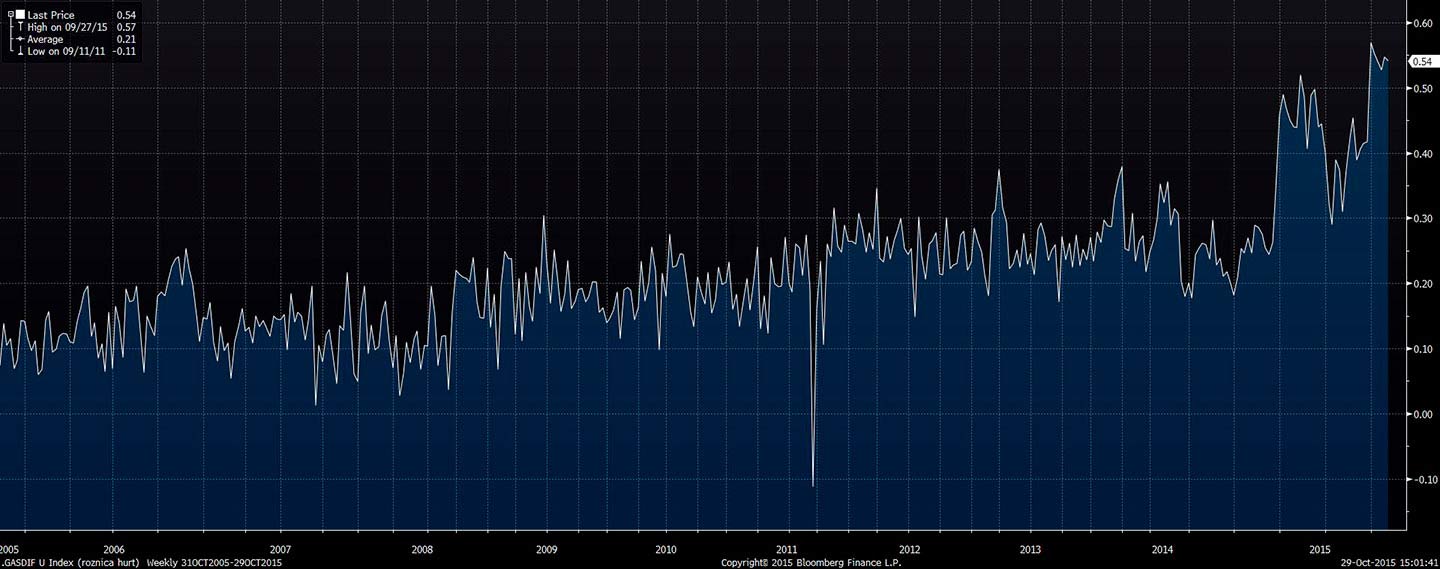For many weeks drivers have been wondering why petrol is so expensive since the quotations of oil have depreciated by 60%. However, it is worth changing your way of thinking and start to pay attention to the wholesale market. There we can find the answer to why the prices of PB 95 have not decreased – comments from Marcin Lipka Cinkciarz.pl currency analyst.
Pobierz PDF (451.0 kB)
The past months brought about many analyses, which tried to explain the issue of the small decrease in the retail price of fuel. In comparison to changes in rates on the oil market, it was really minor. Why? The fuel market is specific. The price of oil does not directly translate to the cost of its products. Additionally, there are issues concerning changes in the rate of the zloty to the dollar. One can also not forget about the taxes, whose influence on the final price is more than 50%. In the end, the final price is also increased by the retail margin, which differs depending on the location.
Considering such a significant overvalue of oil, drivers have the right to think that the price of unleaded fuel at petrol stations is too high. The greatest disturbances are observed in the dependencies of the wholesale market with prices of completed fuel on the European market.
ARA quotations (short for the harbours Amsterdam, Rotterdam, Antwerp – author's footnote) are indicators for the prices of unleaded fuel in Europe. Thus, it is best to compare the difference between the ARA 95 prices (completed fuel of 95 octanes, expressed in the PLN), to the retail prices of national refineries, before adding excise, petrol fees, and VAT.
Comparison of the ARA 95 prices to Polish refinery wholesale prices

- Bloomberg, Lotos
- The price of unleaded fuel in national wholesale, without tax, excise, and petrol fees (white line). Price of 95 RON 10 ppm ARA (yellow line). Both values are expressed in litres and PLN. The latest quotation is from October 28th.
Between 2005 and 2008, the difference between the ARA prices and quotations in the national refineries was between 0.10 and 0.15 PLN per litre. It is understandable when the fact of adding different supplements to unleaded fuel, and also the necessity of stocking the product is considered.
The situation slightly changed between 2008 and 2009. At that time, there was a clear decrease in prices, and the difference was more than 0.20 PLN. However, with the sudden rate changes in the global stock markets, the higher difference can also be justified by the higher financial risk related to economic activities. It is also worth noting that in December 2008 the ARA 95 petrol cost only 0.60 PLN per litre. At the same time, the wholesale price of PB 95 at Polish refineries, without tax, excise, and petrol fees, was 0.80 PLN per litre.
The difference between the prices in Polish wholesale and ARA 95

- Źródło: Bloomberg, Lotos, Obliczenia własne
- The difference between the Polish wholesale price of PB 95 and ARA 95, expressed in PLN. The negative value in September 2011 is not a mistake, but a consequence of a parliamentary campaign in 2011. The leading topic was regarding the price of fuel. This was the only moment in which the wholesale price of fuel in Polish refineries was lower than ARA 95.
In the following years, when the zloty was weak and oil and its products were relatively expensive the price of one litre of ARA 95 increased. In 2012 one litre cost 2.85 PLN. The most popular wholesale unleaded fuel cost slightly more than 3 PLN. However, despite the quite large movements of every variable creating the price of completed fuel, the difference between ARA 95 and the prices at the national refineries was still within the limits of 0.25 PLN.
The situation changed significantly during the second quarter of this year, after a recent decrease wave. In April, the difference between ARA 95 and national wholesale prices reached 0.50 PLN. This was not a one-time situation. The difference of more than 0.40 PLN lasted until the end of June. However, there were still no records. Since the end of September, the average difference between ARA 95 and the prices at the national refineries was more than 0.50 PLN per litre. In its peak it reached 0.58 PLN. On October 27th, the wholesale price per litre of unleaded fuel was 1.68 PLN, and ARA 95 was at the level of 1.10 PLN.
It is worth noting that if national wholesale prices overvalue the average price by 0.30 PLN net, then assuming the steady retail margins, drivers will pay 0.37 PLN more. This is a result of the necessity to add VAT to the final price. Currently, according to the data from the Polish Chamber of Liquid Fuels, the average price of PB 95 is 4.38 PLN. Thus, if the wholesale margin remains close to the historical average, drivers would pay 4 PLN per litre. There would also be no problem in finding a petrol station that offers unleaded fuel for 3.8-3.9 PLN.
Is the disturbance on the Polish market an exception? Not necessarily. According to the information in The Telegraph from the beginning of the year, David Cameron told the members of the British parliament that he will do everything he can in order to translate the decreases in the fuel market to lower prices for consumers.
In Poland there was also a moment in which politicians joined the discussion regarding the situation on the fuel market. The election campaign for parliament in 2011 brought a lot of ideas in order to ease drivers' fate, and caused retail prices to suddenly decrease to 4.99 PLN per litre of unleaded fuel. This was the only moment in which the difference between national wholesale prices and ARA 95 was negative, at minus 0.10 per litre. The situation returned to normal right after the elections and the difference between wholesale and ARA returned to the area of 0.20 PLN.
However, it is worth noting that 4 years ago the artificial decrease in the price of fuel was impossible to maintain. Currently, the situation is completely different. Disproportions in prices have lasted for a long time, they are very clear and definitely decrease the advantages for consumers, resulting in lower rates of fuel on the markets. In the United Kingdom, the public discussion over this issue caused a correction in prices. Perhaps such a campaign is also needed in Poland, especially that the price of petrol has an impact on practically the whole economy.

